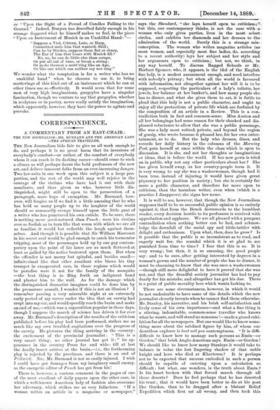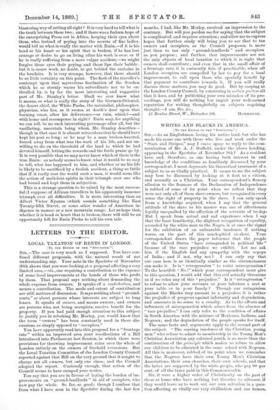CORRESPONDENCE.
A COMMENTARY FROM AN EASY-CHAIR:
THE NEW JOURNALISM-MR. BURNAND AND THE AMERICAN LADY -THE AFRICAN TRAVELLER.
THE New Journalism bids- fair to give us all work enough to do, and perhaps it is no great harm that its invasions of everybody's comfort—or rather, of the comfort of everybody whom it can reach in its dashing career—should come to such a climax as will perhaps daunt the bold professors of the new art, and deliver innocent folks from an ever-increasing danger. Two law-suits in one week upon this subject is a large pro- portion, and the rest of the world may well rejoice in the courage of the victims who have had it out with their assailants, and thus given us who, however little dis- tinguished, might still be open to the persecution of a paragraph, more hope of exemption. Mr. Burnand, how- ever, will forgive us if we find it a little amusing that he who has held so many people up to the laughter of the world should so summarily avenge himself upon the little gnat of a writer who has punctured his own cuticle. To be sure, there is nothing more good-natured than Punch: were his victims ever so foolish as to turn like that worm with which we are all so familiar, it would but redouble the laugh against them- selves. And though it is possible that Sir William Harcourt in his secret soul would be glad enough to catch his tormentor tripping, most of the personages held up by our gay contem- porary upon the point of his lance are as much flattered at least as galled by the notice bestowed upon them. But when the offender is not merry but spiteful, and besides small— infinitesimal like that other assailant who blows his tiny trumpet in exasperated ears, in those regions which would be paradise were it not for the family of the mosquito —the best thing is to fling forth an indignant hand and plaster him to the wall. As for the damage which the distinguished dramatist imagines could be done him by the premature assault, I wonder if this is not an illusion ? I remember passing a very miserable night at an extremely early period of my career under the idea that an earwig had crept into my ear, and would speedily reach the brain and make an end of me,—which was a superstition popular in those days, though I suppose the march of science has driven it for ever away. Mr. Burnand's description of the results of the criticism published before his play had been performed, strikes me as much like my own troubled cogitations over the progress of the earwig. He pictures the thing arriving in the country : the excitement of the provincial journalist : " This is a very smart thing ; no other journal has got it : " its ap- pearance in the country Press far and wide : till at last the deadly insect arrives at the brain,—i.e., the forthcoming play is rejected by the provinces, and there is an end of Pickwick. No; Mr. Burnand is not so easily injured. I wish I could have got damages from my imaginary small enemy, as the energetic editor of Punch has got from his !
There is, however, a curious comment in the pages of one of the most excellent of daily papers upon the other case, in which a well-known American lady of fashion also overcame her adversary, which strikes me as very fallacious. " If a. woman writes an article in a magazine or newspaper,"
says the Standard, " she lays. herself., open to criticism ; '7 but this, our contemporary thinks, is not the case with a, woman who only gives parties, lives in the most select circles, and exhibits her diamonds and her dresses to .the- admiration of the world. Surely this is a strange mis- conception. The woman who writes magazine articles (as most women, and especially most fine ladies, do, according- to a recent authority) lays her subject and her style and her arguments open to criticism; but not, we think, in any way herself. To discuss Ragged Schools or Mr. Herbert Spencer, who, it appears, is the idol of the English fine lady, is a modest amusement enough, and need interfere with nobody's privacy; but when all the world is favoured with information, not altogether against her will it is to be supposed, respecting the particulars of a lady's toilette, her jewels, her balance at her banker's, and how many people she has to dinner, and what she gives them to eat, it is futile to- plead that this lady is not a public character, and ought to enjoy all the protections of private life which are forfeited by the composition of an article in a Review. This is a con- tradiction both in fact and common-sense. Miss Austen and all her belongings had some reason for their shocked and dis- pleased reluctance to allow that she was a public personage.. She was a lady most retired, private, and beyond the region of gossip, who wrote because it pleased her, for her own enter- tainment, so to do. But the lady who dresses, dines, and records her daily history in the columns of the Horning Post, puts herself at once within the class which is open to- discussion. It is she, and not her thoughts or imaginations or ideas, that is before the world. If her new gown is tried on in public, why not any other particulars about her ? She has given herself away, as her country-people term it. It is very wrong to say she was a washerwoman, though had it been true, instead of injuring, it would have given great piquancy to her position in society ; but she is certainly far more a public character, and therefore far more open to- criticism, than the harmless writer, even when (which is a, practice I disapprove) she signs her name.
It is well to see, however, that though the New Journalism supposes itself to be so successful, public opinion is so entirely against it, that from the Bench downwards to the humblest. reader, every decision hostile to its professors is received with approbation and applause. We are all pleased with a pungent contradiction when nothing better can be had, and acknow- ledge the downfall of the social spy and tittle-tattler with. delight and enthusiasm. Upon what, then, does he grow? Is it possible that the public is so inconsistent as to read, and eagerly wait for, the scandal which it is so glad to see punished from time to time ? I fear that this is so. It is very wrong ; but then, it is so amusing, the good people say : and to be sure, after getting interested by degrees in a,. woman's gowns and the number of people she has to dinner,, it must be charming to know that she was once a washerwoman —though still more delightful to have it proved that she was not, and that the dreadful society journalist has had to pay dearly for his mistake, and altogether has got his due. There is a point of public morality here which wants looking to.
There are some circumstances, however, in which it would be not undesirable to have some of the details which the new journalist cleverly invents when he cannot find them otherwise.. Mr. Stanley, his narrative, and his brisk self-satisfaction and lively sense of his own importance—and what a fine thing is a stirring, indomitable, common-sense traveller who knows what he wants, and will stand no nonsense !—made a grand exhi- bition for all the newspapers. But one would like to know some- thing more about the subdued figure by him, of whom our
dauntless explorer is tant soft peu contemptuous. It is diffi- difficult to -know how to manage such persons as Emin—or Gordon," that brisk Anglo-American says. Emin—or Gordon r We should like to know how many Stanleys it would take to balance in value the last lingering shadow of that noble knight and hero who died at Khartoum? It is perhaps not to be expected that success embodied in such a person, should be capable of entering upon a calculation so difficult : but what, one wonders, is the truth about Emin Is his heart broken with that forced march through all those deserts ? Does he feel perhaps that he has deserted his trust ;, that it would have been better to die at his post like Gordon, than to be dragged after a blatant Relief Expedition which first set all wrong, and then took this blustering way of setting all right ? It is very hard to tell what is the truth between these two ; and if there was a forlorn•hope of the enterprising Press out in Africa, keeping their eyes about them, who, instead of prying into the secrets of fine ladies, would tell us what is really the matter with Emin,—if it is his head or his heart or his spirit that is broken, if he has lost courage or desire to go on living after his work is over, or if he is really suffering from a mere vulgar accident, we might forgive those eyes their prying, and those lips their babble : but it is easier work, no doubt, to get behind the curtains in the boudoirs. It is very strange, however, that there should be so little certainty on this point. The flash of the traveller's contempt upon that mysterious fascination of the Soudan which he so sternly warns his subordinate not to be en- thralled by, is by far the most interesting and suggestive part of Mr. Stanley's letter. Shall we ever know what it means, or what is really the story of the German-Oriental, the desert chief, the White Pasha, the naturalist, philosopher, physician, who lies, as it seems, at death's door upon that burning coast, after his deliverance—or rain, which?—and with home and recompense in sight ? Emin may, for anything we can tell, be no such interesting personage after all, but the Taeillating, uncertain being whom Mr. Stanley describes— though in that case it is almost miraculous that he should have kept his post so long : or he may be a man broken-hearted, forced away from what was the work of his life, and not un- willing to die on the threshold of the land to which he had devoted himself, letting the rewards and the futile praise go by. It is very possible that we may never know which of these is the true Emin : as nobody seems to know, what it would be so easy to tell, what has happened to him, and whether or no his life is likely to be sacrificed by a foolish accident, a thing so futile that if it really cost the world such a man, it would seem like the action of malicious spirits in their triumph over one who had bound and kept them in subjection.
This is a strange question to be raised by the most success- ful (I suppose) of African travellers in his apparently immense triumph over all difficulties. It is more interesting than an Albert Victor Nyanza (which sounds something like East Twenty-fifth Street, or some other wonder of American in- digence in names) or a new mountain range. Let us hope that, whether it is head or heart that is broken, there will still be an opportunity left for Emin Pasha to tell his own tale.











































 Previous page
Previous page